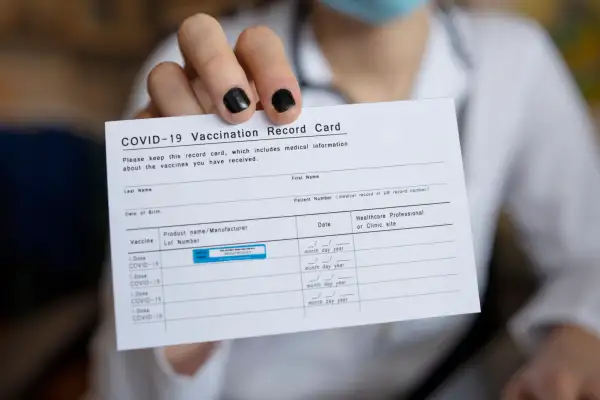Please Stop Posting Pictures of Your COVID-19 Vaccination Cards on Social Media

If you’re one of the newly vaccinated people who couldn’t help but share a celebratory selfie with proof, you’re not alone.
Photos of COVID-19 vaccination cards are all over social media, with the hashtag #vaccinated and captions like “here’s to a better future” and “you miss 100% of the shots you don’t take.”
Over 32 million doses of the vaccine have been administered in the U.S., according to the Centers for Disease Control and Prevention, and, understandably, people are excited about it. But security experts say you should think twice before posting photographic proof of a card that spells out your full name, birthday and where you got your vaccine.
If there’s money or opportunity tied to information people share online, you can be sure bad guys will leverage it, says Richard Bird, Chief Customer Information Officer at the cybersecurity firm Ping Identity. We wouldn’t leave our medical records laying around our house or office for everyone to see, and we should treat our personal data with the same level of care online, he says.
Scammers can do a lot of nefarious things with the seemingly minimal information on a vaccination card—like open a new credit card or utilities account, or buy a cell phone in your name, says Sandra Guile, a spokesperson for the Better Business Bureau (BBB). You may not even realize that personal information has been stolen until you start getting bills you don’t recognize, or calls from creditors asking why you haven't paid those bills.
On top of all the usual concerns, tax filing season is upon us. Scammers could add the info on your vaccination card to the other personal data you have floating around on the Internet—like previous addresses or your Social Security number—to file your tax return before you ever get around to it, Guile says. (Yes, that means you’d miss out on a refund.)
Social media fads like posting a photo of your vaccination card are pretty common. Remember when everyone was posting screenshots of their stimulus check deposits? But that doesn't make them safe. Even viral Facebook posts asking you to share your top 10 favorite songs or the first concert you ever went to are sometimes phishing attempts in disguise, Guile says. Scammers can use those fun posts to answer your security questions when trying to get into your bank or social media accounts.
Another COVID-era concern is scammers selling fake vaccination cards, which some have been doing via eBay and TikTok in the United Kingdom, according to a news release from the BBB. By sharing photos of your card, you may be giving scammers information they need to create phony cards.
That doesn’t mean you can’t post a celebratory vaccine photo. An image of a vaccine sticker—similar to the “I Voted” stickers we see around election day—is a safer option, according to the BBB. Or maybe snap a picture of the Band-Aid the nurse gave you.
In general, it's best to stick to Guile's rule-of-thumb for digital security: “Try to keep your personal life personal as much as possible instead of putting it all out there."
More from Money:
Answers to All Your 2021 Tax Questions, From Stimulus Checks to New Deductions
A Viral Takedown of a $45 Hydro Flask Turned This Former Wall Streeter Into a TikTok Star
What Happens to My Personal Information After a Data Breach?
